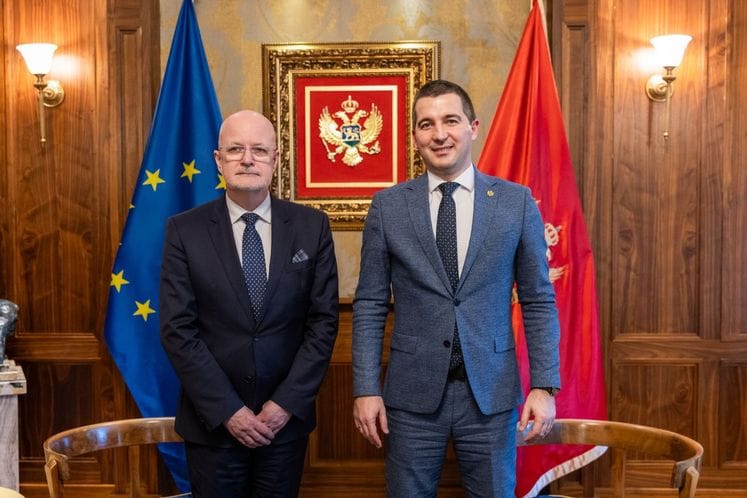- Government of Montenegro
Deputy Prime Minister Bečić meets with CPT Preside...
Deputy Prime Minister Bečić meets with CPT President Alan Mitchell

Deputy Prime Minister Aleksa Bečić met with President of the European Committee for the Prevention of Torture and Inhuman or Degrading Treatment or Punishment (CPT) Alan Mitchell. The meeting provided an opportunity to discuss CPT recommendations regarding human rights protection and the enhancement of institutional mechanisms in Montenegro, in line with the European Convention for the Prevention of Torture, to which Montenegro is a signatory.
Montenegro is committed to the principles of democracy, rule of law, and human rights protection. Collaboration with international institutions, especially with the oldest pan-European organisation, the Council of Europe, whose principles are the foundation of modern democracy, provides additional encouragement on this path. According to Deputy Prime Minister Bečić, "through constructive collaboration with international partners, including the CPT, the Government of Montenegro strengthens institutions and enhances standards for the protection of human rights and freedoms, raising awareness about the importance of preventing torture and abuse."
Montenegro will assume the Presidency of the Council of Europe from 2026 to 2027, in accordance with the rotating principle. These months will coincide with two significant anniversaries: 20 years of independence and 10 years of NATO membership. We believe that during this time, we will witness the announcement of the finalisation of the EU accession process. The very positive and encouraging messages we hear these days from Brussels regarding the results of the new Government and authorities show that Montenegro is finally making significant strides towards membership, that the closing of chapters is becoming a reality and a topic of discussion, and that this generation of politicians will not miss the rare historical opportunity that presents itself, emphasised the Deputy Prime Minister.
Bečić emphasised that the Government has taken concrete steps, such as amendments to the Criminal Code, which will strengthen the legal framework for combating torture and abuse, contributing to the realization of European standards in the field of human rights.
The relevant institutions are actively working on implementing the CPT recommendations. Through training and strengthening of human resources, as well as harmonizing subordinate legislation with these recommendations, we strengthen legal and institutional mechanisms for an effective response to cases of torture and abuse, Bečić stated.
In addition to legislative solutions, Mitchell also mentioned specific measures that the authorities can use to enhance the protection of detained persons from violence and torture. "Cameras that police officers would wear during their duty, as well as audio-visual records from the interrogation of detained persons, are powerful support mechanisms for protection against violence and false accusations against police officers," Mitchell emphasised.
Bečić, affirming the continuous need for improvement of mechanisms aimed at prevention, added that every police officer who acts contrary to the law must be held accountable.
We have a zero-tolerance policy towards infiltration of crime and corruption within the ranks of security structures, as well as any form of conduct that fundamentally undermines human rights, as evidenced by numerous prosecutions and arrests of officials in the past 100 days. The democratic processes that have finally taken root in Montenegro make the quality and accountability with which decision-makers treat all social issues much more visible. In this sense, the role of the prosecution is crucial, but of course, also the executive authority, which must not be limited only to prosecution, but also to the measure of suspending officials who have tarnished the honorable police badge with improper behaviour, emphasised Bečić.

